The BBC's War Correspondents and Engineers
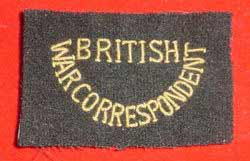
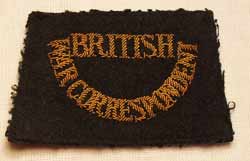
Two shoulder patches.
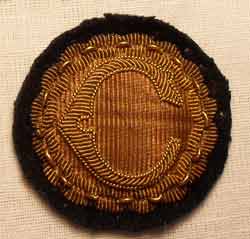
Cap patch.
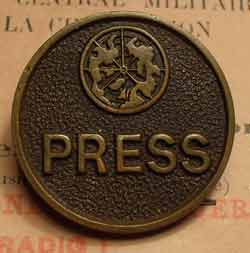
Press badge.
Western Front
Correspondents: Robert Barr, David Bernard, Guy Byam (killed during an Eighth US Air Force raid on Berlin, 3/2/45), Richard Dimbleby; Rupert Downing, Robin Duff, Robert Dunnett, Alfred Fletcher, Frank Gillard, Denis Johnston, Pierre Lefevre, Stewart MacPherson, Howard Marshall, Stanley Maxted, Alan Melville, Richard North, Cyril Ray, Robert Reid, E. Colston Shepherd, Michael Standing, Kent Stevenson (killed during an RAF Lancaster raid on North-West Germany, 22/6/44), Wynford Vaughan-Thomas, Edward Ward, Douglas Willis, Colin Wills, Chester Wilmot, Ian Wilson.
Recording Engineers: C.D. Adamson, W.R. Arnell, F.J. Cooper, W.S. Costello, D.H. Farley, J.C. Fonvielle, Sydney Gore, H.L. Hayhurst, W.H.E. Lindop, T.A. Mellor, Reg Pidsley, H.O.Sampson, H.F.L. Sarney, Stanley Unwin, G.F. Wade, J.B. Watson.
Transmitter Staffs: C.F.R. Abbott, F.A. Cormack, W.H.E. Flint, J.H. Gilman, G.D. Herrin, R.W. Howard, W.A. Jackson, W.H.E. Lindop, T.G. May, E.P. Metcalfe, R.L.S. Newman, J. Oates, J. Shallcross, A.E. Snowdon, J.T. Stocking, P.H. Walker, A.E. Windsor.
Italy
Correspondents: Reginald Beckwith, Frank Gillard, Francis Hallawell, John Nixon, Michael Reynolds, Patrick Smith, Godfrey Talbot.
Recording Engineers: C.C. Carlyon, Douglas Farley, Stanley Unwin, G.W. Wade, Herbert Walden.
Rome Staff: R.C. Ashton, G.F. Beresford, Edward Bonong, R.W. Leslie, Arthur Philips.
Burma
Correspondent: Richard Sharp (see below).
Recording Engineer: Eugene Girot.
Balkans
Correspondent: Kenneth Matthews.
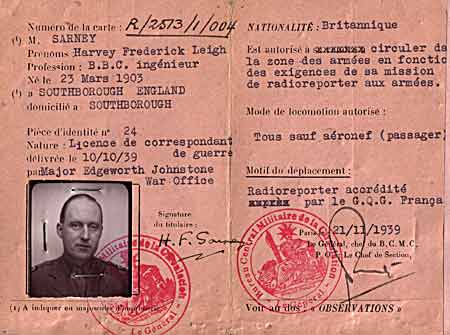
A press pass belonging to engineer Harvey Sarney.
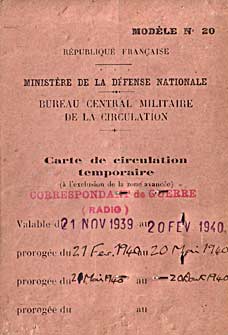
Correspondents at work
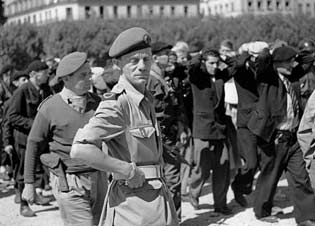
above: BBC correspondent Rupert Downing watches
collaborators being marched away. Paris, August 1944.
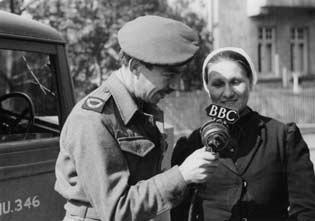
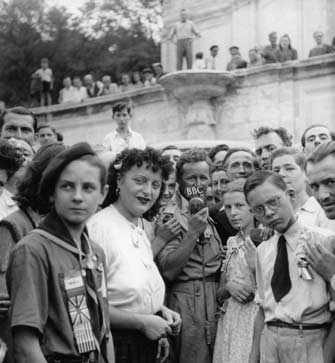
above: Wynford Vaughan Thomas reporting the liberation
of Paris. August 1944.
left: A correspondent, probably Edward Ward,
interviewing a released prisoner from the labour camp at Thekla, near
Leipzig, April 1945.
These three photos are by Reg Pidsley.
These three photos are by Reg Pidsley.
Timothy Sharp supplied some photos showing his father, Richard. In the first one, taken in 1945, Home News Talks Editor, Donald Boyd (seated) is seen with four correspondents. Left to right they are Chester Wilmot, Richard Sharp, Godfrey Talbot and Frank Gillard.

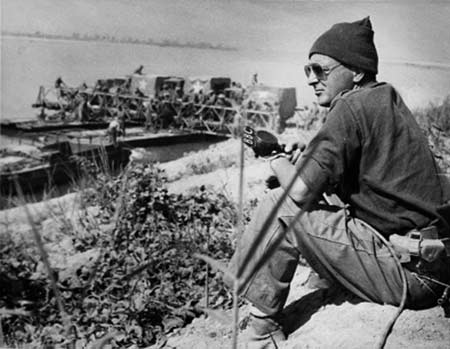
Below left is probably Richard's 'official' BBC photo and, right, a frame from an Indian newsreel showing Richard tending a wounded Japanese.
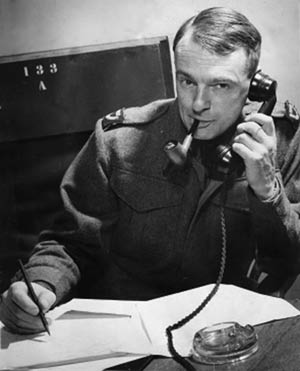
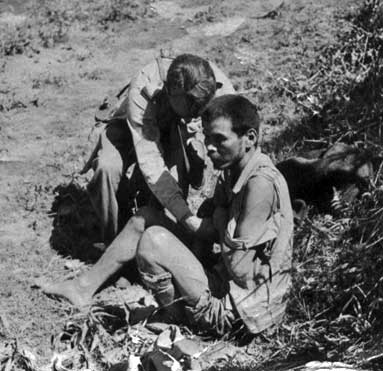
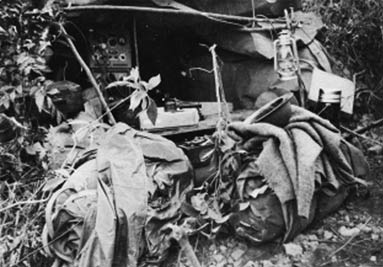
This is a recording set up in the jungle during the battle for Kohima. Richard described how, in order to be able to record on this particular day, all the recording equipment had to be carried into the jungle and hidden in the undergrowth. They called it Broadcasting House!
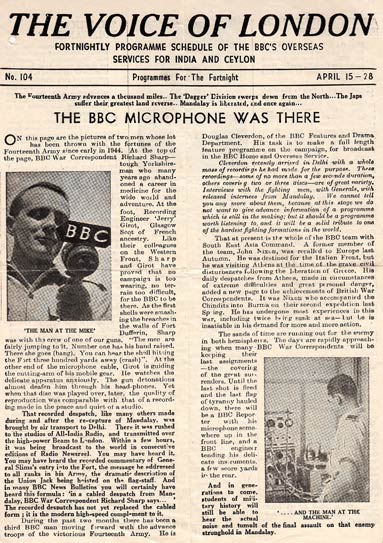
ON this page are the pictures of two men whose lot has been thrown with the fortunes of the Fourteenth Army since early in 1944. At the top of the page, BBC War Correspondent Riphard Sharp - tough Yorkshireman who many years ago abandoned a career in medicine for the wide world and adventure. At the foot, Recording Engineer 'Jerry' Girot, Glasgow Scot of French ancestry. Like their colleagues on the Western Front, Sharp and Girot have proved that no campaign is to wearing, no terrain too difficult, for the BBC to be there. As the first shells were smashing the breaches in the walls of Fort Dufferin, Sharp was with the crew of one of our guns. "The men are fairly jumping to it. Number one has his hand raised. There she goes (bang). You can hear the shell hitting the Fort three hundred yards away (crash)". At the other end of the microphone cable, Girot is guiding the cutting-arm of his mobile gear. He watches the delicate apparatus anxiously. The gun detonations almost deafen him through his head-phones. Yet when that disc was played over, later, the quality of reproduction was comparable with that of a recording made in the peace and quiet of a studio.
That recorded despatch, like many others made during and after the re-capture of Mandalay, was brought by air transport to Delhi. There it was rushed to the studios of All-India Radio, and transmitted over the high-power Beam to London. Within a few hours, it was being broadcast to the world in consecutive editions of Radio Newsreel. You may have heard it. You may have heard the recorded commentary of General Slims's entry into the Fort, the message he addressed to all ranks in his Army, the dramatic description of the Union Jack being hoisted on the flag-staff. And in many BBC News Bulletins you will certainly have beard this formula: 'in a cabled despatch from Mandalay, BBC War Correspondent Richard Sharp says...' The recorded despatch has not yet replaced the cabled form; it is the modern high-speed complement to it.
During the past two months there has been a third BBC man moving forward with the advance troops of the victorious Fourteenth Army. He is Douglas Cleverdon, of the BBC Features and Drama Department. His task is to make a full length feature programme on the campaign, for broadcast in the BBC Home and Overseas Service. Cleverdon recently arrived in Delhi with a whole mass of recordings he had made for the purpose. These recordings - some of no more than a few seconds duration, others covering two or three discs - are of great variety. Interviews with the fighting men, with Generals, with released internees from Mandalay. We cannot tell you any more about them,, because at this stage we do not want to give advance information of a programme which is still in the making; but it should be a programme worth listening to, and it will be a solid tribute to one of the hardest fighting formations in the world.
That at present is the whole of the BBC team with South East Asia Command. A former member of the team, John Nixon, was recalled to Europe last Autumn. He was destined for the Italian Front, but he was visiting Athens at the time of the grave civil disturbances following the liberation of Greece. His daily despatches from Athens, made in circumstances of extreme difficulties and great personal danger, added a new page to the achievements of British War Correspondents. It was Nixon who accompanied the Chindits into Burma on their second expedition last Spring. He has undergone most experiences in this war, including twice being sunk at sea - but he is insatiable in his demand for more and more action.
The sands of time are running out for the enemy in both hemispheres. The days are rapidly approaching when many BBC War Correspondents will be keeping their last assignments - the covering of the great surrenders. Until the last shot is fired and the last flag of tyranny hauled down, there will be a BBC Reporter with his microphone somewhere up in the front line, and a BBC engineer tending his delicate instruments, a few score yards in the rear.
And in generations to come, students of military history will still be able to hear the actual noise and tumult of the final assault on that enemy stronghold in Mandalay.

